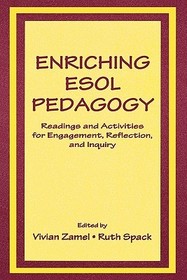
Enriching Esol Pedagogy
Readings and Activities for Engagement, Reflection, and Inquiry
- Publisher's listprice GBP 69.99
-
33 437 Ft (31 845 Ft + 5% VAT)
The price is estimated because at the time of ordering we do not know what conversion rates will apply to HUF / product currency when the book arrives. In case HUF is weaker, the price increases slightly, in case HUF is stronger, the price goes lower slightly.
- Discount 20% (cc. 6 687 Ft off)
- Discounted price 26 750 Ft (25 476 Ft + 5% VAT)
Subcribe now and take benefit of a favourable price.
Subscribe
33 437 Ft

Availability
Estimated delivery time: In stock at the publisher, but not at Prospero's office. Delivery time approx. 3-5 weeks.
Not in stock at Prospero.
Why don't you give exact delivery time?
Delivery time is estimated on our previous experiences. We give estimations only, because we order from outside Hungary, and the delivery time mainly depends on how quickly the publisher supplies the book. Faster or slower deliveries both happen, but we do our best to supply as quickly as possible.
Product details:
- Edition number 1
- Publisher Routledge
- Date of Publication 1 July 2002
- ISBN 9780805839395
- Binding Paperback
- No. of pages472 pages
- Size 229x152 mm
- Weight 880 g
- Language English 0
Categories
Short description:
Provides a theoretical perspective and offers ways for making the teaching of English to speakers of other languages meaningful for both teachers and learners. Textbook for second-language methodology courses.
Long description:
Enriching ESOL Pedagogy: Readings and Activities for Engagement, Reflection, and Inquiry is a collection of thought-provoking articles and activities designed to engage practicing and prospective ESOL teachers in an ongoing process of reflecting on, critically examining, and investigating theory and practice. Its twofold purpose is to provide a theoretical perspective and to offer ways for making the teaching of English to speakers of other languages (ESOL) meaningful for both teachers and learners. Underlying the activities and the readings themselves is the assumption that teachers need to play a role in exploring, shaping, and theorizing the work they do.
The readings included represent a range of genres. They are informed by a common philosophical perspective about language acquisition and treat language teaching and learning holistically. The book is organized into five integrated units that:
* raise questions about conventional notions of methods;
* take into account the complicated nature of real classrooms;
* provide theoretical principles for teaching that promotes language acquisition;
* include rich descriptions of actual classroom experiences; and
* question assumptions about language and literacy.
Each set of readings begin with a "Before Reading" section and is followed by "Reflecting on the Readings," "Reading for Further Reflection," and "Suggested Projects for Inquiry" sections.
This volume is a valuable resource for practicing and prospective teachers in the field of TESOL who work with diverse student populations--at all levels--in both mainstream and ESL/bilingual settings.
"this anthology has two major strengths: (a) the essays in the collection are well-written and well-documented articles, mainly by leading specialists in ESOL research and pedagogy; and (b) the reflection and inquiry activities designed by the editors stimulate introspection, application, and extension of the ideas presented in each section of the book."
&&&8212;The Modern Language Journal
"...this is a book that ESOL methods teachers and students should find very useful in grappling with some of the more salient issues in the field."
&&&8212;Studies in Second Language Acquisition
"I am very enthusiastic about this book. It will provide a much-needed resource for the field."
&&&8212;Judith Rodby
California State University, Chico
"Zamel and Spack have set out to rectify a major problem with second language and literacy teacher training, and that is its lack of intellectual depth, a lack stemming from a historical focus on classroom practice as separated from theory-making....By asking faculty/teachers-in-training to think about others' ideas and experience and their own, to observe and reflect, to work on making sense of what they know, and to connect and integrate in order to create their own learning, they are bringing second-language training into social theory and vice versa....This book has the potential for affecting significant change."
&&&8212;Linda Lonon Blanton
University of New Orleans
Table of Contents:
Contents: Preface. Introduction. Part I: Questioning the Nature of Methods. M.A. Clarke, S. Silberstein, Problems, Prescriptions, and Paradoxes in Second Language Teaching. A. Holliday, Teachers' and Students' Lessons. C.M. Roller, Classroom Interaction Patterns: Reflections of a Stratified Society. A. Pennycook, The Concept of Method, Interested Knowledge, and the Politics of Language Teaching. Part II: Seeing the Classroom. J.F. Fanselow, Let's See: Contrasting Conversations About Teaching. K.M. Losey, Gender and Ethnicity as Factors in the Development of Verbal Skills in Bilingual Mexican American Women. L. Harklau, ESL Versus Mainstream Classes: Contrasting L2 Learning Environments. G. Hull, M. Rose, K.L. Fraser, M. Castellano, Remediation as Social Construct: Perspectives From an Analysis of Classroom Discourse. C. Genishi, Observing the Second Language Learner: An Example of Teachers' Learning. Part III: Theories Into Practice: Promoting Language Acquisition. S. Krashen, Theory Versus Practice in Language Training. K. Krahnke, M.A. Christison, Recent Language Research and Some Language Teaching Principles. M.A. Clarke, On the Nature of Technique: What Do We Owe the Gurus? E.R. Auerbach, What Is a Participatory Approach to Curriculum Development? Part IV: Theories Into Practice: Keeping Language Meaningful. J.W. Lindfors, The Classroom: A Good Environment for Language Learning. S. Hudelson, Teaching English Through Content-Area Activities. V. Zamel, From the Margins to the Center. K. Boudin, Participatory Literacy Education Behind Bars: AIDS Opens the Door. Part V: Questioning Assumptions About Language and Identity. H.G. Widdowson, The Ownership of English. Y-S.D. Chiang, M. Schmida, Language Identity and Language Ownership: Linguistic Conflicts of First-Year University Writing Students. S. Vandrick, ESL and the Colonial Legacy: A Teacher Faces Her 'Missionary Kid' Past. S.J. Ortiz, The Language We Know. A. Tan, Mother Tongue.
More



